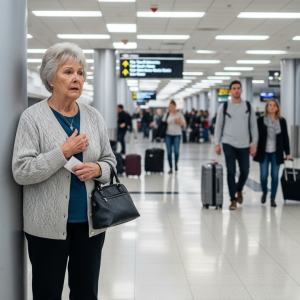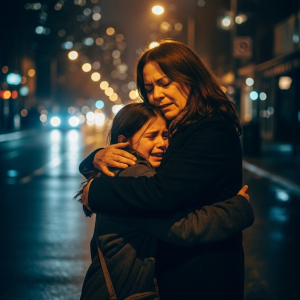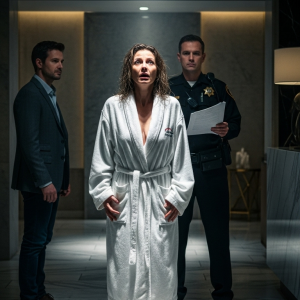The call that shattered my world wasn’t a crackle of static from a distant warzone, but a cold, clinical voice from a world away. One moment, I was in the operations room overseas, the final review of my 40-year career laid out before me. The next, a clipped, impersonal voice on the line was informing me of an “emergency” concerning my son, Daniel. Protocol and instinct took over. Within the hour, my duffel bag was packed. Forty years of service had taught me efficiency, but this felt different. This wasn’t a deployment; it was a retreat from the life I knew, a frantic, desperate pilgrimage homeward.
The trans-Atlantic flight was a purgatory of recycled air and the ceaseless drone of engines. I stared out the window, but I didn’t see the blanket of clouds or the thin, promising line of dawn. I saw Daniel’s face—his smile that could light up a room, the way his eyes crinkled at the corners when he truly laughed. We hadn’t spoken as much as I’d liked recently. My missions, his life… the distance had become more than just geographical. But I held onto the belief that we could always pick up where we left off.
Clutched in my pocket was the silver pocket watch my father had given me before my first deployment. “This will always guide you home,” he’d said. Its cold, familiar weight was a small anchor in a sea of terrifying uncertainty. Turbulence shook the cabin, but it was nothing compared to the storm brewing inside me.
Landing in Florida was like stepping into a furnace. The humid air was a thick, suffocating blanket. The taxi driver loaded my bag without a word.
“Naples,” I said, my voice hoarse. I gave him Daniel’s address, the words feeling foreign on my tongue. As we drove, the palm trees swayed in the hazy air, indifferent witnesses to my mounting dread. A tightness coiled in my chest, a knot of fear I couldn’t swallow. We turned onto his street, and the knot became a block of ice.
The house was a portrait of neglect. The lawn, once meticulously kept, was overgrown and choked with weeds. The mailbox overflowed with rain-warped envelopes. Every curtain was drawn tight, shutting out the world. It didn’t look like a home. It looked like a place that had given up.
Just as I stepped out of the cab, a familiar voice called my name. “Maricela?”
It was Mrs. Turner, Daniel’s neighbor since he’d bought the place. She stood on her porch, a watering can clutched in her hand, her face pale with a mixture of pity and shock.
“Oh, Maricela,” she rushed over, her voice a hushed, urgent whisper. “I didn’t know how to reach you. It’s Daniel…” She hesitated, her eyes darting away as if she couldn’t bear to deliver the next words. “They took him by ambulance two weeks ago. In the middle of the night.”
My blood ran cold. “Where is he? And Brianna… where is his wife?”
Mrs. Turner looked down, wringing her hands. “He’s at Naples General. In the ICU. As for Brianna…” She took a deep breath. “…she’s been posting from the Keys. On a yacht. Celebrating, it looks like.”
The world tilted on its axis. The heat, the drone of a distant lawnmower, Mrs. Turner’s worried face—it all faded into a roaring in my ears. A yacht. While my son lay in an intensive care unit, she was celebrating. The pocket watch in my hand felt impossibly heavy, no longer a guide but an anchor pulling me down into the abyss.
The hospital was a maze of sterile white corridors, the air thick with the sharp, clean scent of disinfectant that clung to everything. My footsteps echoed, each one a drumbeat of impending doom. At the fifth-floor reception desk, a nurse’s eyes flickered with recognition when I gave her Daniel’s name.
“Room 512,” she said, her voice softened with a professional sympathy that did nothing to soothe me. “Dr. Cross can update you.”
The hallway to the ICU was unnervingly quiet, punctuated only by the steady, rhythmic beeping of machines keeping people tethered to life. Pushing open the door to Room 512, the sound became a symphony of dread.
And then I saw him.
My son, my vibrant, strong Daniel, was a pale, shrunken version of himself, lost in a sea of white sheets and tangled in a web of tubes and wires. A man in a white coat turned from the monitors as I entered.
“Ma’am, I’m Dr. Cross.” His voice was low, gentle. “Your son has advanced gastric cancer. It’s terminal. I’m so sorry.”
The word hung in the air, a final, irrevocable judgment.
“If we’d caught it sooner, there might have been more time,” the doctor continued, his gaze unwavering. “He’s been here for two weeks, ma’am. Alone.”
Alone. That single word was a physical blow, knocking the air from my lungs. I moved to the bedside as if in a dream, my fingers brushing the back of his hand. It was cold, the skin fragile and thin.
His eyelids fluttered open. For a heart-stopping moment, he was my boy again. Those were the same hazel eyes that had watched me leave on a dozen deployments, the same eyes that had lit up with mischief and love.
“Love you, Mom,” he whispered, the words a ghost of a breath, a final gift.
And then, the steady, rhythmic beep of the monitor beside his bed didn’t just falter—it flatlined into a single, piercing, unending scream.
Nurses rushed in, a whirlwind of calm, practiced urgency. Dr. Cross gently guided me out into the hall. I stood there, frozen, listening to the frantic commands, the shuffle of feet, the desperate thud of hands on my son’s chest. Minutes later, the door opened. Dr. Cross emerged, his face a mask of exhaustion and sorrow.
“I’m sorry,” he said, the two most inadequate words in the English language. “We did everything we could.”
The watch in my hand was now a searing brand against my palm. I hadn’t just come home. I had come home too late.
Driving back to Daniel’s house, the world was a muted, colorless blur. The keys Brianna had left under the mat felt alien in my hand. Pushing the door open, a wave of stale, stagnant air washed over me—the smell of a life put on hold, then abandoned.
The living room was dark, the coffee table littered with empty glasses filmed with dust. But it was the kitchen that told the real story. Takeout containers and unwashed dishes were piled high in the sink. On the counter, a mountain of mail leaned precariously against the wall.
My fingers, strangely steady, tore through the envelopes. Utility shut-off warnings. Overdue credit card statements. A late mortgage notice. Daniel had never been careless with money. This was a deliberate unraveling.
I moved to his small office. The chair was pushed back, as if left in a hurry. The desk was a chaotic landscape of papers. Among them, I found a thick stack of receipts, held together by a simple paperclip. My breath caught in my throat.
The first was for a yacht rental in Key West. $150,000. The date was from the same week Daniel had been admitted to the hospital.
Another was from a high-end jeweler in Miami. $200,000. For what, I could only imagine.
Page after page, the story unfolded in cold, hard numbers. Lavish dinners at oceanfront resorts, shopping sprees at luxury boutiques, spa treatments—all charged to Daniel’s accounts, all while he lay dying. Each receipt was another nail hammered into my son’s coffin, paid for with his life’s savings.
Sinking into his desk chair, I found a small, leather-bound notebook—his ledger. Daniel had meticulously recorded everything. “March 8th: $3,000 for Brianna’s medicine.” I cross-referenced it with a credit card statement. The “medicine” was a charge from an exclusive spa in Palm Beach. “April 12th: $5,500 for roof repairs.” The statement showed a payment to a designer boutique.
The deception was so brazen, so complete, it was breathtaking. In an archived folder on his phone, which the hospital had given me, I found the final piece of the puzzle. A message from Brianna to a friend.
“Might as well enjoy his money while I can. He won’t last long.”
A cold, hard fury, unlike anything I had ever felt on the battlefield, settled deep in my bones. This wasn’t just greed. This was a monstrous cruelty. My grief began to burn, transforming into something else entirely: a quiet, unshakeable resolve. She hadn’t just let my son die alone. She had danced on his grave before he was even in it. And she was going to pay for it.
My fingers were steady as I dialed her number. She answered on the second ring, her face appearing on my screen, framed by the blinding white deck of a yacht against a brilliant blue sea. Music pulsed in the background, punctuated by shrieks of laughter. She held a glass of something bright orange, a smug, self-satisfied smile on her lips.
“Maricela!” she chirped, as if we were old friends catching up. “Finally decided to call, did you?”
I kept my voice flat, devoid of emotion. “Daniel’s gone, Brianna.”
Her smile faltered for a fraction of a second, a tiny crack in her perfect facade. Then, she shrugged, taking a slow, deliberate sip from her glass. “Well, what did you expect me to do? Sit around and watch him fade away? It was inevitable. Nothing anyone could do.”
The callousness of it was staggering. “And the charges?” I pressed, my voice like ice. “The yacht? The jewelry?”
She laughed, a short, ugly sound. “I’m his wife. What’s his is mine. That’s how marriage works, Maricela.”
She didn’t even try to feign remorse. I studied her face, memorizing every detail—the designer sunglasses, the shimmer of gold in her ears, the wind tangling her perfectly styled hair.
“Enjoy the view, Brianna,” I said, leaning forward so my face filled the screen. My voice dropped to a low, dangerous whisper. “Because that party is the last thing you’ll ever pay for on my son’s dime.”
I ended the call before she could respond, leaving her image frozen in a mask of confusion and dawning anger. My next call was to Javier Ortiz. He had been my commanding officer years ago and was now a trusted friend who managed financial administration for military families.
“Javier,” I said, the moment he answered. “I need a nuclear option. I’m sending you documents now. I need every account linked to my son, Daniel Dane, frozen. Everything.”
There was no hesitation in his voice. “Send it through, Maricela. I’ll take care of it.”
Within the hour, it was done. Every card was canceled, every account frozen, every remaining balance transferred to a holding account under my control. The first of Brianna’s frantic, furious voicemails began to flood my phone. They started as a barrage of curses and threats, then slowly morphed into something else.
“Maricela, please,” her voice, now stripped of its arrogance, pleaded. “I just need some money for expenses. We can work this out.”
Not once did she say my son’s name. I let the phone ring, the vibrations a steady, satisfying reminder that the game had changed. She had made her move. Now, it was my turn.
The courthouse was cold and imposing, its high ceilings swallowing sound. I sat at the petitioner’s table, Javier beside me, his files stacked with military precision. Across the aisle, Brianna whispered furiously to her lawyer, a slick man in a gray suit who oozed false confidence. She adjusted her designer blazer, a portrait of aggrieved innocence.
When the judge called the session to order, Javier rose. He spoke with a calm, deliberate authority, laying out the timeline with brutal clarity: Daniel’s diagnosis, his solitary stay in the ICU, and Brianna’s conspicuous absence.
Then came the evidence. Projected onto the large screen behind him, the bank statements appeared, a river of red numbers flowing out of Daniel’s accounts. The receipts for the yacht, the jewelry, the luxury resorts—each one a silent, damning witness. Finally, he displayed her text message: “Might as well enjoy his money while I can. He won’t last long.” A collective gasp rippled through the courtroom.
Brianna’s lawyer stood, his voice smooth as oil. He spoke of “spousal property” and a “grieving widow’s right to cope,” attempting to paint me as a vindictive mother-in-law trying to punish a woman in pain.
The words were meaningless noise. The judge, a stern-faced woman with intelligent eyes, leaned forward, her gaze fixed on the mountain of evidence. She listened patiently, then held up a hand, silencing the lawyer mid-sentence.
“Given the clear, documented evidence of financial misuse,” she began, her voice ringing with authority, “the gross spousal abandonment during a terminal illness, and the credible medical testimony, this court finds the petitioner’s request more than justified.”
She looked directly at Brianna, her expression unyielding. “The court hereby orders all assets of the late Daniel Dane immediately frozen. Temporary control of the estate will be granted to Maricela Dane. You, Ms. Dane, are prohibited from accessing any related property or funds until further order.”
The sharp crack of the gavel was the sweetest sound I had ever heard.
Brianna shot to her feet, her face flushed a blotchy red. “You’ll regret this! You can’t do this to me!”
Two bailiffs moved in, gently but firmly guiding her toward the exit as her threats dissolved into incoherent sobs. I remained seated, my hands folded, feeling the crushing weight I’d been carrying for weeks finally begin to lift. It wasn’t victory. It was justice. And it was just the beginning.
In the hollow silence of Daniel’s house, I began the work of dismantling one life to build another. The money in those frozen accounts wasn’t just currency; it was years of my son’s hard work, his dreams, his future. It couldn’t sit untouched.
I contacted the hospital and, with Javier’s help, established a non-profit organization in Daniel’s name: The Dane Foundation. Its mission was simple: to provide financial and emotional support for patients who had been abandoned by their families or left without resources during their most vulnerable moments.
The first person the foundation helped was a boy named Gabriel. He was eight years old, with eyes that held a wisdom far beyond his years. He had leukemia and no family to sit by his bedside. I pulled a chair up to his bed, introduced myself, and for the first time since Daniel’s death, I felt a flicker of purpose that wasn’t fueled by anger.
“I just want someone to stay,” he whispered, his voice small.
“I’m here now,” I promised. And I was.
Weeks later, Gabriel came to live with me. We painted his new room a brilliant blue, a color he chose because it “reminded him of a clear day.” We planted a garden in the backyard, turning over the earth where Daniel and I had once planted saplings together. Gabriel’s laughter began to fill the quiet spaces of the house, not replacing the memories of my son, but harmonizing with them.
One evening, as the sun set over the Gulf, Gabriel and I walked down to the shore. I carried a small wooden frame with a photo of Daniel from years ago, his smile radiant enough to outshine the sun. Gabriel carried a smooth, flat stone he’d found in our new garden.
We found a spot where the gentle waves kissed the sand and set the photo down, with Gabriel placing his stone beside it to keep it safe. We stood there for a long time, watching the sky bleed into shades of pink and gold. Gabriel slipped his small hand into mine, his grip warm and steady.
In that quiet moment, I understood. Love doesn’t vanish; it transforms. The grief for my son was now intertwined with my love for this boy. The legacy Daniel left behind wasn’t in a bank account; it was in the chance to give another soul the comfort and care he had been denied. We were building something new, something that neither of us would ever have to leave behind. Turning toward home, I knew the house we were returning to was more than just walls and windows. It was a place held together by a love that had survived the unimaginable. And for the first time in a very long time, that was enough.




